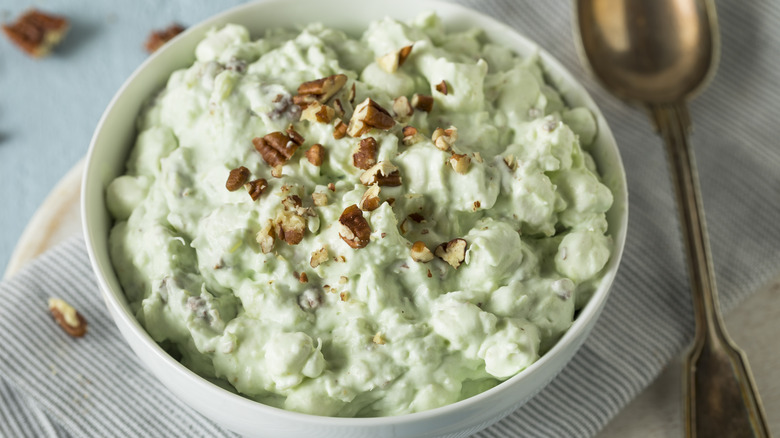The Real Reason It's Called Watergate Salad
This summer marks the 50th anniversary of the infamous Watergate scandal that rocked American politics and led to the resignation of President Richard Nixon (via KTLA). Unsurprisingly, the salad that shares its name with the infamous crime, has a murky history as well.
Travel back to 1972, and you could enjoy a cool bowl of Watergate Salad, a blend of pistachio pudding, canned pineapple, chopped pecans, marshmallows, and whipped cream, per NPR. Clearly, the term "salad" is used quite generously here. The dish previously went by a number of more objectively accurate names, including "Pistachio Delight," "Green Fluff," and, most enticing of all, "Green Goop" (via Farmers' Almanac).
According to NPR, the dish first emerged in the early 1900s, decades before the Watergate Hotel was built. It was brought on by the development of instant gelatin, which allowed people to easily make marshmallows and gelatin molds. This led to a trend in fluffy, marshmallow-based dessert "salads" such as the Watergate, and closely related Ambrosia Salads. They remained fashionable menu items well into the second half of the century, but interestingly enough, there was one place you'd probably never find them.
Watergate Salad was never sold at the Watergate Hotel
Even at the height of the dessert salad trend, there is no evidence that the Watergate Hotel ever served Watergate Salad, per NPR. The salad actually gets its name from Watergate Cake, which is made from similar ingredients and uses pistachio pudding for icing (via Atlas Obscura). But that begs the question — where did Watergate Cake get its name? Once again, evidence suggests that the Watergate Hotel never served this dessert, and the exact origin of the name is still subject to debate.
The most popular theory, as reported by NPR and Mental Floss, points to an article published in a Hagerstown, Maryland, newspaper in September 1974, one month after Nixon resigned. It explains that the Watergate name is a piece of satirical wordplay, based on the fact that the cake had a "cover-up" in the form of its thick frosting and that, much like Washington D.C., the cake was "full of nuts." The dish quickly caught on because the word "Watergate" was already on everybody's tongues in the mid-1970s.
At some indeterminate point in time, the Watergate name was transferred from the cake to its salad cousin. Nobody can pin down exactly when or where this transition occurred. For a time, both dishes rode the disgraced president's coattails to nationwide popularity, but today, you are unlikely to find the Watergate Salad on any menu.

